Gift giving and receiving on special days
快乐的庆祝圣诞节英语作文

快乐的庆祝圣诞节英语作文Introduction:Christmas, one of the most celebrated festivals worldwide, brings a sense of joy, love, and togetherness. The holiday season is a time to commemorate the birth of Jesus Christ, exchange gifts, and create cherished memories with loved ones. In this essay, we will explore various aspects of Christmas celebrations and how they bring happiness and cheer to people's lives.1. Decorating for Christmas:The process of decorating our homes, streets, and cities marks the beginning of the festive spirit. The sound of Christmas carols, colorful lights, and the smell of pine from the Christmas tree fill the air. The act of decorating brings families closer as they work together to beautify their surroundings, igniting a sense of joy and anticipation for the upcoming celebrations.2. Gift-giving and Receiving:One of the most exciting aspects of Christmas is exchanging gifts with family and friends. The joy of selecting and wrapping presents for loved ones creates a warm and special feeling. Witnessing the excitement and happiness on their faces when they unwrap their gifts fills our hearts with immense joy. It is said that, "It is more blessed to give than to receive," and this sentiment holds true during the Christmas season.3. Spreading Love and Kindness:Christmas provides an opportunity to spread love and kindness by engaging in acts of charity. Many people volunteer at shelters, soup kitchens, or donate to various charitable organizations during this time. Spread the holiday cheer by reaching out to those in need, and experience the genuine happiness that comes from helping others.4. Family Traditions:Every family has its unique Christmas traditions that serve to create long-lasting memories. Whether it's baking Christmas cookies, watching holiday movies, or attending midnight Mass, these traditions bring families together and create a sense of collective joy and unity. Family members eagerly anticipate the return of loved ones during this festive season, fostering closeness and creating unforgettable moments.5. Delicious Christmas Food:Christmas is a time when delectable dishes take center stage. The aroma of freshly baked gingerbread cookies, roasted turkey, and traditional Christmas puddings bring immense happiness to our taste buds. Preparing and sharing meals with loved ones strengthens bonds and fills the atmosphere with warmth and cheer.6. Festive Events and Activities:During the Christmas season, cities come alive with various festive events and activities that further enhance the joy of the season. Christmas markets, ice-skating rinks, and beautifully lit parades create a magical atmosphere. These festivities serve as a platform for people to come together, celebrate, and forge new friendships, amplifying the joy and happiness emanating from the holiday spirit.7. Christmas Music and Carols:The soulful tunes of Christmas music and the joyous singing of carols uplift the spirit and remind us of the true meaning of the season. Whether it's attending a choir concert or simply singing carols with family and friends around the fireplace, the music of Christmas brings immense happiness and creates a sense of unity and peace.Conclusion:In conclusion, the celebration of Christmas brings immense joy, love, and togetherness. The act of decorating, exchanging gifts, spreading love and kindness, family traditions, delicious food, festive events, and carols all contribute to the joyful atmosphere associated with this special holiday. It is important to remember that the true essence of Christmas lies in spreading happiness and love to all, making it a truly joyous occasion each year. As we celebrate Christmas, let us embrace the spirit of love, unity, and happiness that it brings and carry it throughout the year.。
反馈(给予和收到)(Feedback(givingandreceiving))
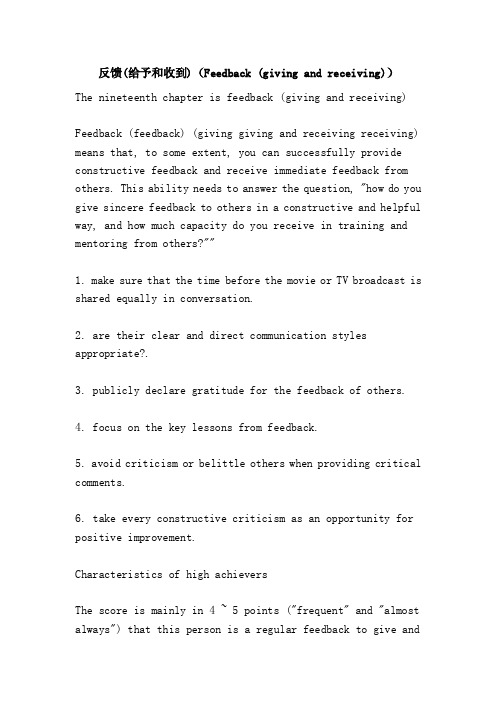
反馈(给予和收到)(Feedback (giving and receiving))The nineteenth chapter is feedback (giving and receiving)Feedback (feedback) (giving giving and receiving receiving) means that, to some extent, you can successfully provide constructive feedback and receive immediate feedback from others. This ability needs to answer the question, "how do you give sincere feedback to others in a constructive and helpful way, and how much capacity do you receive in training and mentoring from others?""1. make sure that the time before the movie or TV broadcast is shared equally in conversation.2. are their clear and direct communication styles appropriate?.3. publicly declare gratitude for the feedback of others.4. focus on the key lessons from feedback.5. avoid criticism or belittle others when providing critical comments.6. take every constructive criticism as an opportunity for positive improvement.Characteristics of high achieversThe score is mainly in 4 ~ 5 points ("frequent" and "almost always") that this person is a regular feedback to give andreceive information, and use it as a can improve ourselves and others exchange knowledge and actively approach. They tend to be skilled in giving feedback to others, while inviting others to give feedback and accept valuable advice.A high score makes it easy to build as many harmonious conversations as possible with other communication groups. Make public, receive, and give constructive feedback as a means of building a solid relationship while talking deeper and truer with people.The trait of a lower ranking personThe score is mainly in 1 ~ 2 points ("little" and "occasionally") that this person is not a person often give and receive feedback, they may even try to avoid doing constructive comments to others or accept feedback (positive and negative). They may take a quiet approach, or begin to escape when asked to receive or give feedback.A low achievers may adopt a "closed" approach to communication. They only offer very little or no constructive feedback to others, and conversely, they do not want others to provide feedback. The conversation may be a bit mechanical and exchange oriented, where neither side gets any benefit and proper guidance and training.Action suggestions for low achieversLow achievers need to receive feedback from two channels as a major means of communication. This means that the feedback thatis genuinely offered will become easier to accept and provide honest and helpful feedback publicly at the appropriate time.Try to understand that giving and receiving constructive feedback is a major means by which learning and improvement can happen to everyone.Take notes of what you hear, provide structural and specific feedback to others, and often invite people to provide public feedback on the same basis.Always make constructive comments, not negative and destructive comments.When you receive feedback or give feedback to others, be sensitive to other people's feelings. Avoid damaging opinions, personal attacks and unwarranted insults, etc..Be cordial and frank when accepting feedback from others.FGR-1Evaluation project: make sure that the time before the movie or television broadcast is equally shared in conversation.There is an old saying that when two people always agree, one person is enough. Similarly, when two people are together, only one person always says, and the other person doesn't need it! Any meaningful way of communicating is two-way, not one-way. If a ship's commander insists on disobeying orders, it will be difficult to allow his crew to remind him of an iceberg ahead,and he will command "full speed ahead."". Effective communicators try to be sure that "the time before television and movie play" is shared equally.Consider doing the following to improve your overall performance:1. realize that you may have a tendency to speak too long. Ask another person to give you a fair feedback.2. try not to often trouble others. If you need something, remember it in your heart and give it another opportunity.3., realize that other people want to speak and show nonverbal behavior. These nonverbal signals include:Raise your fingers or pens, as if you were bidding on the auctionHands up!Nod fasterBriskly up and backMove the chair forwardLeaning against the tableUse your eyes to communicate with youSend forth a rapidly increasing nonverbal sound ("Er")4. when you have finished what you want to say, ask the other person's reaction. You don't have to finish everything right away. Similarly, if you feel you need to finish what you say, however, the topic has changed or someone else has introduced the topic to a related topic, don't be embarrassed,You can bring back the topic again.5. remember a motto: two ears, one mouth: two times as much as you hear. If you press this rate too hard, at least try to speak and listen to 1:1.FGR-2Evaluation projects: are their clear and direct communication styles appropriate?.Feedback is critical to the functioning of any organization and the normal maintenance of any relationship, but it may be ineffective if the feedback is not direct and clear. Effective communication, knowing how to provide feedback, and ensuring minimal distortion and vagueness.Consider the following measures to improve the overall effectiveness of the field:1. don't talk not to the point. You should take the key. It doesn't make sense if you have something important to talk about and talk to others about. Other people immediately feel that something is wrong and that they become very nervous at the sametime. It is possible to give negative feedback in a positive way.2. know what you want to say, and then break it down to specific points. Use this approach in the feedback process or at the beginning of the opportunity:"To use this machine, you need to do four things."""When you deal with this department, there are two things you shouldn't forget.""3. use an oral title. Just as the article in the newspaper expresses the focus of the article with a title, you should also use a verbal theme sentence so that others directly know what you are going to say.4. if you use text communication, plan as much as possible so that your information is clear. Count a few points, use dots, headings, use different fonts and font sizes to emphasize the key points, use color to emphasize the key, and use diagrams that you think will help you communicate clearer and more interesting.5. use simple English, not terminology. Use short sentences rather than long sentences and use scientific terms as little as possible.FGR-3Evaluation project: publicly declares gratitude for feedbackfrom others.Good feedback from others is a gift. You need to let people know that you are grateful for this gift, or you will hurt someone's feelings and you will have fewer gifts. Effective communicators declare publicly that they appreciate feedback from others.Consider the following measures to improve the overall effectiveness of the field:1. consciously stop talking and listen. Stay focused on other people's conversation and nod your head when you understand.2. thank them publicly in specific language, for example:"Well, thank you very much for that. I need to know that.".""I'll think about it, thank you for letting me know before the situation gets out of hand."."I really appreciate your spending so much time explaining this to me, and I'm very grateful to you for giving me the opportunity to think about it.3. don't think it's embarrassing to say thank you. There is no need to exaggerate or falsely express thanks. In fact, it will offend others, they will not want to tell you again. Speak modestly and respectfully, but be honest and frank.4., continue to act to strengthen the effect. When you communicate with them verbally or verbally, point out thefeedback they have given you. It should be done like that:"That's the number you want.". By the way, thank you for what you said that day. It makes me see a lot of things."OK, I'll catch up with you and your team next week. By the way, thank you for giving me feedback. It's really a great help. We need it too much.5. compliment when appropriate. Give feedback to others. Imitation is the sincerest form of flattery.FGR-4Evaluation project: focus on key lessons from feedback.Feedback is the basis of problem solving. It's related to what it used to be. It's diagnosis. But what will happen in the future? Effective communicators focus their efforts on key lessons from feedback.Consider the following measures to improve the overall effectiveness of the field:1. everyone is one hundred percent wise after the event. The trick is one hundred percent foresight. We learn the foresight by drawing lessons from feedback, and by carefully planning the future to predict the future as accurately as possible. This includes the use of new information, which we derive from feedback.2., when giving feedback, the point is to solve the problem, not blame. Not for revenge, political persecution, to worry: people will become strong defensive, you will be very difficult to find the truth. Don't kill to make it! Adjust things so that people are willing to tell the truth, not to twist or lie.3. change the way you look at your mistakes. Mistakes are opportunities for learning, at least for someone to stop talking and do things. Make sure this attitude becomes part of your culture.4. a great philosopher once said that those who have not learned the wrong history often make mistakes again and again.With history instead of feedback, you'll get a good operating rule. Seeing feedback as an opportunity to learn experience will help create a new way of doing things. The dinosaur and the tiger with the sharp teeth are handed down by our forefathers, which is our feedback today. Now what dinosaur and razor sharp tiger tracks you and your colleagues again, what can you do?5. be calm before making negative feedback. If given negative feedback, allow calm or deal with time. When we get negative feedback, our self-esteem hurts, and we justify ourselves, regardless of whether the feedback is true or not. Sooner or later, we'll have to say it's my fault. It's easier to admit mistakes after a mistake. Make sure anyone who gives you negative feedback is in a low-key manner. Don't put others injured all over the body, we must have to face the people, only give them the opportunity, they will learn to correct.FGR-5Evaluation project: when providing critical comments, avoid insulting or belittling others.When we provide critical comments, we should be based on a problem-solving attitude. Effective communicators should avoid insulting or belittling other critics when they make critical comments.Consider the following measures to improve the overall effectiveness of the field:1. discuss matters regardless of people. If you are individual, you will cause a struggle to expose privacy: leaving the truth, you will lose the opportunity to really solve the problem.2. avoid all types of sarcasm when you give feedback about criticism. It is likely to be confusing and essentially weaken what you are trying to do. Just stay at the level of what you're going to discuss.3., do not try to establish an example by linking several special cases together. In conflict intensive situations, we often find that we tend to try to establish an example of refuting others by linking them to situations where there is only one relationship. (now, you sound like your mother!" Or "you messed up again, just like you did last week and last week.". Sometimes, in order to show that we are right and emphasize other people's mistakes, we selectively extract information.Even if there's a connection, stick to the details: it may not even be the right time and place, because..:It's too close to all the other things.In any case, they will defend against a reasonable process.Wait a minute, then expand this issue, talk less, ask more questions, and let them do it themselves.4. investigate your purpose. Do you try your best to solve the problem, or do you just want effortless stimulation?Pick on someoneTo prove them wrong, you are rightProve yourself indispensableBecause you don't have enough faith in a boss who has ever humiliated you, you need to vent your feelings about a victimAll of these are bad purposes. They are demeaning - even worse than punishment.FGR-6Evaluation project: take every constructive criticism as an opportunity for positive improvementThe way we respond to feedback depends on our attitude toinformation. Once we have this information, what are we going to do about it? Effective communicators treat each constructive critique as an opportunity for positive improvement.Consider the following measures to improve your overall effectiveness in this field:1. do not resist when accepting feedback. Do not interrupt when listening to good ideas. Our ears will stand up when we hear constructive feedback, but others will be alarmed when we make constructive comments. It all depends on what you think is constructive, doesn't it? Try to separate your ego andself-esteem from your performance in a particular task. Be ready to listen to what other people have to say about your performance in this particular task. Don't confuse self-esteem with the correctness of the problem.2., you know, you can use many ways to teach someone a process or a skill. Show them two or three ways, so that they can choose for themselves. When someone gives you feedback, be sure that feedback is constructive and see feedback as an opportunity to understand how others see your work.3. be ready to learn and never stop learning. Remember, people who give you feedback today may get your feedback tomorrow. Feedback may take place in the same field or in a completely different field: A may be able to respond to B's processing of electronic data tables on Friday, and B may be able to give A feedback on golf rotation on Monday. Finally, it's a big circle, accepting feedback so you can give feedback.4. think of feedback as a way to avoid painful investments. For many of us,Such experience will work:A. is hard to take advice.B. is hard to believe that other people's opinions can help us see our flaws or shortcuts.C. we'd rather do it ourselves.D. oh! It hurts!E. ah, what do they mean?.Oscar Wilde once said, "experience is the name of the mistake we gave us.". If we listen carefully to others, but not with our prejudices, we may avoid saying "oh". A painter once said, "because we stand on the shoulders of giants, we and our contemporaries can easily achieve success.". The present generation has benefited from the forerunners of the past generation. Keep smart enough to receive feedback, and keep your ego is smart enough not to be hurt.。
三个国家礼仪英语作文英语六年级
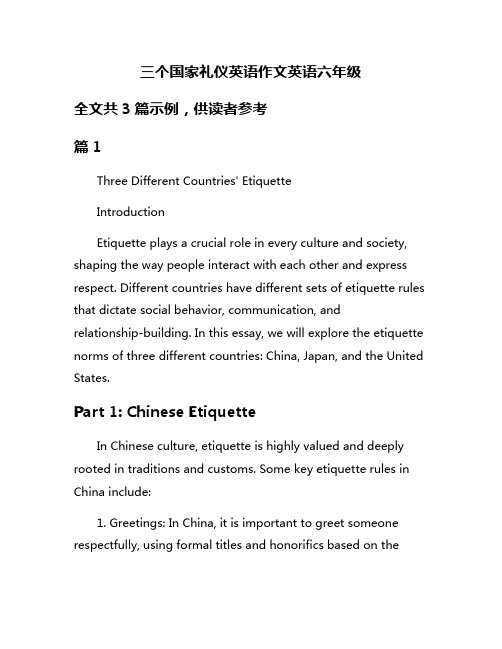
三个国家礼仪英语作文英语六年级全文共3篇示例,供读者参考篇1Three Different Countries' EtiquetteIntroductionEtiquette plays a crucial role in every culture and society, shaping the way people interact with each other and express respect. Different countries have different sets of etiquette rules that dictate social behavior, communication, and relationship-building. In this essay, we will explore the etiquette norms of three different countries: China, Japan, and the United States.Part 1: Chinese EtiquetteIn Chinese culture, etiquette is highly valued and deeply rooted in traditions and customs. Some key etiquette rules in China include:1. Greetings: In China, it is important to greet someone respectfully, using formal titles and honorifics based on theperson's age and status. Traditional greetings include bowing or nodding the head slightly.2. Dining etiquette: When dining in China, it is important to wait for the host to start eating before beginning your meal. Chopsticks should be used correctly, and it is considered polite to leave a little food on your plate to show that you are full.3. Gift-giving: Giving and receiving gifts is a common practice in China, especially during holidays and special occasions. When giving a gift, it is important to present it with both hands and avoid giving items in sets of four, as the number four is considered unlucky.Part 2: Japanese EtiquetteJapanese culture places a strong emphasis on politeness and respect for others. Some important etiquette rules in Japan include:1. Bowing: Bowing is a common form of greeting and showing respect in Japan. The depth and duration of the bow can vary depending on the situation and the level of formality.2. Addressing others: Japanese people often use honorific titles when addressing others, such as "-san" for general respect or "-sama" for higher respect. It is important to use these titleswhen speaking to someone, especially when meeting them for the first time.3. Removing shoes: In Japan, it is customary to remove your shoes before entering someone's home, a traditional inn, or certain public places like temples. This shows respect for the cleanliness of the space and the host.Part 3: American EtiquetteAmerican etiquette is more informal compared to Chinese and Japanese etiquette but still important in social interactions and professional settings. Some key etiquette rules in the United States include:1. Greetings: Americans typically greet each other with a handshake, which is a common gesture of friendliness and respect. It is also common to use "please" and "thank you" when speaking to others.2. Personal space: Americans value their personal space and often maintain a comfortable distance when interacting with others. It is important to respect someone's personal space and avoid standing too close or touching them without permission.3. Dining etiquette: In the United States, it is common to wait for everyone at the table to be served before starting to eat.Using utensils correctly, chewing with your mouth closed, and engaging in polite conversation are all part of American dining etiquette.ConclusionEtiquette reflects the values, beliefs, and social norms of a culture, shaping the way people communicate and interact with each other. By understanding and respecting the etiquette rules of different countries, we can build stronger relationships and show courtesy and respect to others. Whether in China, Japan, the United States, or any other country, etiquette plays a vital role in fostering positive and harmonious interactions among people.篇2Three countries with different cultures and traditions also have unique etiquette practices. Let's explore the etiquette customs of China, Japan, and the United States.China is a country rich in history and traditions. Etiquette is highly valued in Chinese culture and plays a significant role in daily interactions. One of the most important customs is showing respect to elders and individuals of higher social status. It is common to address people with titles like "Mr." or "Mrs." anduse formal language to show respect. When greeting someone, a bow or nod of the head is common, particularly when meeting for the first time. It is also important to avoid touching others in public and maintain personal space.In Japan, etiquette is deeply rooted in the culture and reflects the values of respect and humility. Bowing is a common way to greet others in Japan, with the depth of the bow depending on the individual's status or relationship. It is important to show respect by using formal language and demonstrating humility in interactions. Gift giving is also an essential part of Japanese etiquette, with gifts often given on special occasions or as a gesture of gratitude. Removing shoes before entering a home or certain buildings is another important custom in Japan to show respect for cleanliness and customs.The United States has its own unique etiquette practices that reflect the cultural diversity of the country. In general, Americans value individuality and informality in social interactions. When greeting someone, a handshake is common, with a smile and direct eye contact to show friendliness. It is customary to address people by their first names, regardless of their age or social status, and to use casual language in conversations. Personalspace is also important in American etiquette, with individuals typically maintaining a comfortable distance during interactions.Overall, etiquette plays a significant role in shaping social interactions and relationships in different cultures. By understanding and respecting the customs of others, we can foster meaningful connections and appreciation for the diversity of the world.篇3Three Countries' EtiquetteEvery country has its own unique culture and traditions that shape the way people behave and interact with each other. One important aspect of a country's culture is its etiquette – the proper way to behave in social situations. In this essay, we will explore the etiquette of three different countries: the United States, China, and France.United StatesIn the United States, there are certain rules of etiquette that are considered important in social situations. For example, it is considered polite to shake hands when meeting someone for the first time or when greeting someone you haven't seen in a while.Additionally, it is customary to say "please" and "thank you" when making requests or receiving help from others.Another important aspect of American etiquette is punctuality. Being on time is highly valued in American culture, and being late to a meeting or appointment is seen as disrespectful. It is also common for Americans to make small talk when meeting someone new, asking about their day or discussing current events.ChinaIn China, etiquette plays a crucial role in social interactions. One important aspect of Chinese etiquette is the concept of "saving face" – avoiding embarrassing or humiliating others in public. It is important to show respect to others, especially elders, and to avoid causing them any loss of face.In Chinese culture, it is customary to bow slightly when greeting someone, especially in formal situations. Additionally, the exchange of business cards is an important part of Chinese etiquette, and it is considered polite to study a business card carefully before putting it away.FranceIn France, etiquette is also an important part of social interactions. For example, it is customary to greet people with a kiss on both cheeks, even if you are meeting them for the first time. Additionally, it is customary to address people by their title and last name until they invite you to use their first name.In French culture, punctuality is not as important as in American culture, and it is common for meetings to start a few minutes late. However, it is still important to be respectful and polite in social situations, and to express gratitude for any hospitality or assistance received.In conclusion, etiquette plays an important role in shaping social interactions in different countries. While the specific rules of etiquette may vary from one country to another, the underlying principles of respect, politeness, and consideration for others are universal. By understanding and following the etiquette of different cultures, we can build stronger relationships and create a more harmonious global community.。
英语作文特殊的礼物
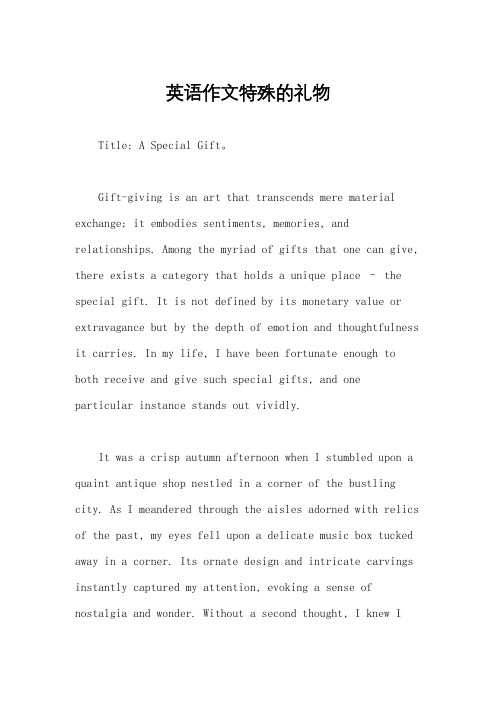
英语作文特殊的礼物Title: A Special Gift。
Gift-giving is an art that transcends mere material exchange; it embodies sentiments, memories, and relationships. Among the myriad of gifts that one can give, there exists a category that holds a unique place – the special gift. It is not defined by its monetary value or extravagance but by the depth of emotion and thoughtfulness it carries. In my life, I have been fortunate enough to both receive and give such special gifts, and oneparticular instance stands out vividly.It was a crisp autumn afternoon when I stumbled upon a quaint antique shop nestled in a corner of the bustling city. As I meandered through the aisles adorned with relics of the past, my eyes fell upon a delicate music box tucked away in a corner. Its ornate design and intricate carvings instantly captured my attention, evoking a sense of nostalgia and wonder. Without a second thought, I knew Ihad found the perfect gift for someone dear to me.The recipient of this special gift was my grandmother, a woman whose presence had graced my life with boundless love and wisdom. Her home, adorned with cherished memories and family heirlooms, reflected her appreciation for the beauty of the past. It was in this spirit that I presented her with the music box, hoping to encapsulate our shared moments in a timeless melody.As she unwrapped the gift, a soft smile tugged at the corners of her lips, and her eyes glistened with unshed tears. In that fleeting moment, I knew that I had succeeded in conveying the depth of my affection and gratitude. Placing the music box gently in her hands, she traced the delicate patterns with her fingertips, each stroke echoing a tale of bygone days.The significance of the gift lay not only in its physical form but in the memories it invoked. As she wound the tiny key and the melody filled the room, time seemed to stand still. It was as if every note carried with it afragment of our shared history – the laughter, the tears, and the quiet moments of companionship. In the simple melody of the music box, we found solace and connection, transcending the boundaries of time and space.In the years that followed, the music box became a cherished relic, a symbol of enduring love and kinship. Its presence served as a reminder of the bonds that tethered us together, weaving a tapestry of memories that spanned generations. Though time may have weathered its delicate exterior, the melody remained etched in our hearts, a testament to the enduring power of love.In retrospect, the true essence of a special gift lies not in its grandeur but in the sincerity of its sentiment. It is a token of affection that transcends the material realm, speaking volumes in the language of the heart. Whether it be a humble music box or a priceless heirloom, the value of a special gift lies in the emotions it evokes and the memories it preserves.As I reflect upon that autumn afternoon and theexchange of the music box, I am reminded of the profound impact that a thoughtful gesture can have. In a world often overshadowed by materialism and superficiality, it is the simple acts of kindness and love that resonate most deeply. And so, I am grateful for the opportunity to have experienced the joy of giving and receiving a special gift – a treasure that will forever hold a place in my heart.。
Chinese gift
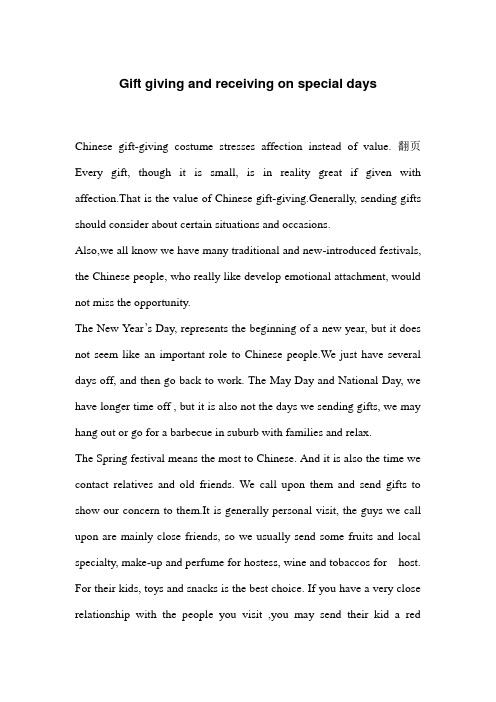
Gift giving and receiving on special daysChinese gift-giving costume stresses affection instead of value. 翻页Every gift, though it is small, is in reality great if given with affection.That is the value of Chinese gift-giving.Generally, sending gifts should consider about certain situations and occasions.Also,we all know we have many traditional and new-introduced festivals, the Chinese people, who really like develop emotional attachment, would not miss the opportunity.The New Year’s Day, represents the beginning of a new year, but it does not seem like an important role to Chinese people.We just have several days off, and then go back to work. The May Day and National Day, we have longer time off , but it is also not the days we sending gifts, we may hang out or go for a barbecue in suburb with families and relax.The Spring festival means the most to Chinese. And it is also the time we contact relatives and old friends. We call upon them and send gifts to show our concern to them.It is generally personal visit, the guys we call upon are mainly close friends, so we usually send some fruits and local specialty, make-up and perfume for hostess, wine and tobaccos for host. For their kids, toys and snacks is the best choice. If you have a very close relationship with the people you visit ,you may send their kid a redenvelope stuffed with money, we call it the lucky money.And it is from elders to juniors.Due to some superstitions exist, we should avoid some taboos when we giving gifts. For example, pear sounds like “leave”in Chinese, which means the family will be separated, so the apple which sounds like “safe”in Chinese will be a better choice. And a Chinese says goes, good things come in pair, so we should avoid odd numbers, even numbers are more easily accepted , esp. involves six and eight,but four is an exception. Because it sounds like “death” in Chinese.And recent years, the valentine’s day becoming more and more popular in China ,though it is not a traditional festival. Boys would send their girlfriends roses and chocolates which means sweet and love. It is a tragedy that I have never been through this.And March the 8th ,women’s day, actually only their husbands and kids send their gifts, such like flowers scarfs, perfumes, clothes,etc. Qingming that is for honor the dead, our ancestors and martyrs. We send them wreath, that sounds a little scary, I mean we just put them on their tombstones.And on Dragon Boat Festival, we eat rice dumplings, which we call it “zongzi”, and race boat, but we don’t send gifts. Because zongzi is usually homemade, so it is not presentable .And Children’s Day,some candies and ice creams for them,or Littlegadgets they like,you know ,kids are easy to cope with. Then the lunar July the 7th, the Chinese Valentine’s day,which originate from a very beautiful fairy tale,but now this festival was westernized more or less.Then the Teachers’Day, just like the name suggests ,we send gifts to teachers, nothing but flowers, that is tough.Double Ninth Festival.The name is nice in Chinese, i donnot know why it is so awful in English. On that day, people climb mountains to avoid calamities initially, and now it was given a new meaning, the day for elderly people. They are more particular about gifts, because they are more superstitious. Remember donnot send clock which sounds like “the end”in chinese. donnot send pears, do not send sth black or white, which represents funerals. do not send medicines, maybe they don’t like gifts at all. Seriously, tea and fruits is the best choice.And another famous traditional festival, mid-autumn festival, that is the day families reunite. Family members will enjoy the glorious full moon and eat moon cakes. And the only gift on that day would be moon cakes. The moon cakes would be dainty in design and packing, then send to their close friends.Another famous introduced western festival, Christmas day , but it is only exists among the younger generation, because they are more fashionable and willing to experience fresh things. On that day, people send apples totheir friends, and we call it “peaceful fruit” only on that day. Just like the Mothers’Day and Fathers’Day ,they are not officially affirmed by the government, but be promoted by the businesses, they are becoming more and more popular, and wild accepted in China. Carnations for mom and shavers or belts for dad is very common.And on some special days and occasions ,like wedding, entrance feast, housewarming and The hundred days feast for babies, the guest who was invited always give the host a red envelope contains several hundred money.In addition, the choose of opportunity to send gifts is also quite important, personal gifting should always done in private. And you may notice my topic is Gift giving and receiving, i donnot want to talk about too much about receiving, because it is easy, just remember donnot hurry to receive gifts, refuse two or three times, which will show your manners, or you would be thought greedy. And do not unwrap it immediately, you should keep it and then open it when the giver leave.And gift exchanging is important in China,but it is not suppose to be in hurry . If you received a gift from someone , remember to give back a relative equivalent present to him the next time he invites you.。
中西方送礼物和接受礼物的差异英语作文
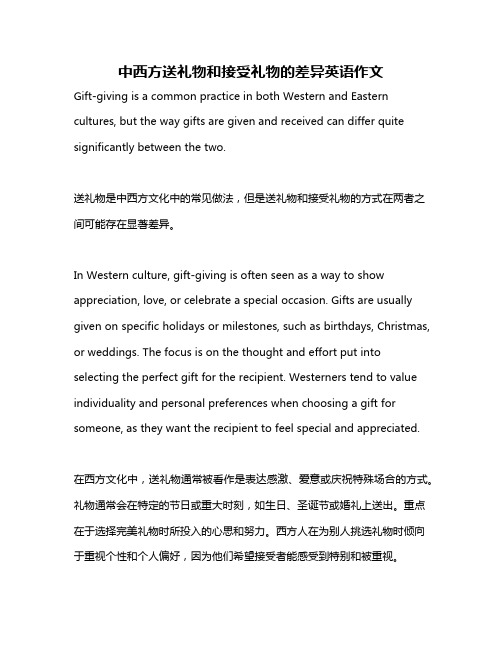
中西方送礼物和接受礼物的差异英语作文Gift-giving is a common practice in both Western and Eastern cultures, but the way gifts are given and received can differ quite significantly between the two.送礼物是中西方文化中的常见做法,但是送礼物和接受礼物的方式在两者之间可能存在显著差异。
In Western culture, gift-giving is often seen as a way to show appreciation, love, or celebrate a special occasion. Gifts are usually given on specific holidays or milestones, such as birthdays, Christmas, or weddings. The focus is on the thought and effort put into selecting the perfect gift for the recipient. Westerners tend to value individuality and personal preferences when choosing a gift for someone, as they want the recipient to feel special and appreciated.在西方文化中,送礼物通常被看作是表达感激、爱意或庆祝特殊场合的方式。
礼物通常会在特定的节日或重大时刻,如生日、圣诞节或婚礼上送出。
重点在于选择完美礼物时所投入的心思和努力。
西方人在为别人挑选礼物时倾向于重视个性和个人偏好,因为他们希望接受者能感受到特别和被重视。
英语作文有利有意义的礼物
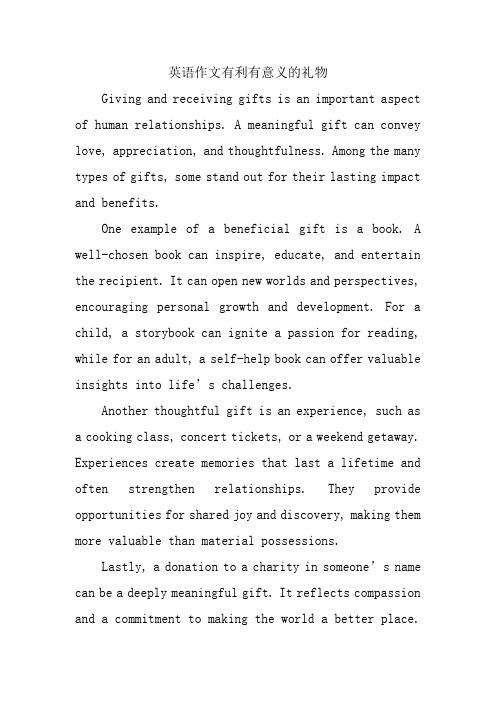
英语作文有利有意义的礼物Giving and receiving gifts is an important aspect of human relationships. A meaningful gift can convey love, appreciation, and thoughtfulness. Among the many types of gifts, some stand out for their lasting impact and benefits.One example of a beneficial gift is a book. A well-chosen book can inspire, educate, and entertain the recipient. It can open new worlds and perspectives, encouraging personal growth and development. For a child, a storybook can ignite a passion for reading, while for an adult, a self-help book can offer valuable insights into life’s challenges.Another thoughtful gift is an experience, such as a cooking class, concert tickets, or a weekend getaway. Experiences create memories that last a lifetime and often strengthen relationships. They provide opportunities for shared joy and discovery, making them more valuable than material possessions.Lastly, a donation to a charity in someone’s name can be a deeply meaningful gift. It reflects compassion and a commitment to making the world a better place.This type of gift not only benefits the recipient but also helps those in need, creating a ripple effect of kindness.In conclusion, meaningful and beneficial gifts can enrich our lives in various ways. Whether it is a book, an experience, or a charitable donation, the thought and intention behind the gift are what truly matter.中文翻译:赠送和接受礼物是人际关系中重要的一个方面。
如何收礼送礼英语作文

如何收礼送礼英语作文Title: Etiquette of Giving and Receiving Gifts。
Gift-giving and receiving are customary practices in many cultures, reflecting kindness, appreciation, and goodwill. Proper etiquette in these exchanges not only ensures the sincerity of the gesture but also strengthens relationships. In this essay, we will explore the protocols of giving and receiving gifts.Firstly, let us delve into the art of giving gifts. When selecting a gift for someone, it is essential to consider their interests, preferences, and needs. A thoughtful gift demonstrates that you value the recipient and have taken the time to understand their tastes. It is advisable to avoid generic presents and instead opt for something personalized or meaningful.Moreover, the presentation of the gift plays a significant role in conveying your sentiments. Wrapping thegift neatly and adding a heartfelt card or note enhancesits appeal and demonstrates your attention to detail. Remember, the manner in which you give the gift is as important as the gift itself. Present it with genuine warmth and sincerity, making the recipient feel appreciated and cherished.Furthermore, it is customary to respect cultural and social norms when giving gifts. In some cultures, certain types of gifts may be considered inappropriate or taboo. Therefore, it is prudent to research the customs and traditions of the recipient's culture to ensure that your gift is well-received and culturally sensitive.Now, let us turn our attention to the etiquette of receiving gifts graciously. When presented with a gift, it is polite to express gratitude sincerely and promptly. Regardless of the value or significance of the gift, acknowledging the giver's thoughtfulness is essential. A simple "thank you" accompanied by a warm smile goes a long way in conveying appreciation.Additionally, it is courteous to open the gift in the presence of the giver, if possible. This allows them to witness your initial reaction and share in the joy of the moment. However, if opening the gift immediately is not feasible, be sure to express your eagerness to do so later.Moreover, if you receive a gift that does not align with your preferences or tastes, it is essential to remain gracious and appreciative. Avoid expressing disappointment or making negative remarks about the gift. Instead, focus on the positive aspects of the gesture and the thoughtfulness behind it.In conclusion, the exchange of gifts is a universal expression of kindness and goodwill. By adhering to proper etiquette when giving and receiving gifts, we can foster meaningful connections and strengthen relationships. Remember, the true value of a gift lies not in its material worth but in the sentiment and sincerity with which it is given.。
Chinese gift

Gift giving and receiving on special daysChinese gift-giving costume stresses affection instead of value. 翻页Every gift, though it is small, is in reality great if given with affection.That is the value of Chinese gift-giving.Generally, sending gifts should consider about certain situations and occasions.Also,we all know we have many traditional and new-introduced festivals, the Chinese people, who really like develop emotional attachment, would not miss the opportunity.The New Year’s Day, represents the beginning of a new year, but it does not seem like an important role to Chinese people.We just have several days off, and then go back to work. The May Day and National Day, we have longer time off , but it is also not the days we sending gifts, we may hang out or go for a barbecue in suburb with families and relax.The Spring festival means the most to Chinese. And it is also the time we contact relatives and old friends. We call upon them and send gifts to show our concern to them.It is generally personal visit, the guys we call upon are mainly close friends, so we usually send some fruits and local specialty, make-up and perfume for hostess, wine and tobaccos for host. For their kids, toys and snacks is the best choice. If you have a very close relationship with the people you visit ,you may send their kid a redenvelope stuffed with money, we call it the lucky money.And it is from elders to juniors.Due to some superstitions exist, we should avoid some taboos when we giving gifts. For example, pear sounds like “leave”in Chinese, which means the family will be separated, so the apple which sounds like “safe”in Chinese will be a better choice. And a Chinese says goes, good things come in pair, so we should avoid odd numbers, even numbers are more easily accepted , esp. involves six and eight,but four is an exception. Because it sounds like “death” in Chinese.And recent years, the valentine’s day becoming more and more popular in China ,though it is not a traditional festival. Boys would send their girlfriends roses and chocolates which means sweet and love. It is a tragedy that I have never been through this.And March the 8th ,women’s day, actually only their husbands and kids send their gifts, such like flowers scarfs, perfumes, clothes,etc. Qingming that is for honor the dead, our ancestors and martyrs. We send them wreath, that sounds a little scary, I mean we just put them on their tombstones.And on Dragon Boat Festival, we eat rice dumplings, which we call it “zongzi”, and race boat, but we don’t send gifts. Because zongzi is usually homemade, so it is not presentable .And Children’s Day,some candies and ice creams for them,or Littlegadgets they like,you know ,kids are easy to cope with. Then the lunar July the 7th, the Chinese Valentine’s day,which originate from a very beautiful fairy tale,but now this festival was westernized more or less.Then the Teachers’Day, just like the name suggests ,we send gifts to teachers, nothing but flowers, that is tough.Double Ninth Festival.The name is nice in Chinese, i donnot know why it is so awful in English. On that day, people climb mountains to avoid calamities initially, and now it was given a new meaning, the day for elderly people. They are more particular about gifts, because they are more superstitious. Remember donnot send clock which sounds like “the end”in chinese. donnot send pears, do not send sth black or white, which represents funerals. do not send medicines, maybe they don’t like gifts at all. Seriously, tea and fruits is the best choice.And another famous traditional festival, mid-autumn festival, that is the day families reunite. Family members will enjoy the glorious full moon and eat moon cakes. And the only gift on that day would be moon cakes. The moon cakes would be dainty in design and packing, then send to their close friends.Another famous introduced western festival, Christmas day , but it is only exists among the younger generation, because they are more fashionable and willing to experience fresh things. On that day, people send apples totheir friends, and we call it “peaceful fruit” only on that day. Just like the Mothers’Day and Fathers’Day ,they are not officially affirmed by the government, but be promoted by the businesses, they are becoming more and more popular, and wild accepted in China. Carnations for mom and shavers or belts for dad is very common.And on some special days and occasions ,like wedding, entrance feast, housewarming and The hundred days feast for babies, the guest who was invited always give the host a red envelope contains several hundred money.In addition, the choose of opportunity to send gifts is also quite important, personal gifting should always done in private. And you may notice my topic is Gift giving and receiving, i donnot want to talk about too much about receiving, because it is easy, just remember donnot hurry to receive gifts, refuse two or three times, which will show your manners, or you would be thought greedy. And do not unwrap it immediately, you should keep it and then open it when the giver leave.And gift exchanging is important in China,but it is not suppose to be in hurry . If you received a gift from someone , remember to give back a relative equivalent present to him the next time he invites you.。
中西方送礼物和接受礼物的差异英语作文
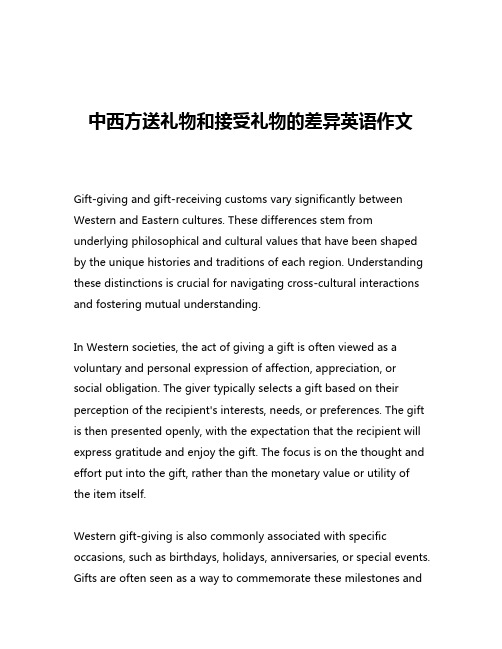
中西方送礼物和接受礼物的差异英语作文Gift-giving and gift-receiving customs vary significantly between Western and Eastern cultures. These differences stem from underlying philosophical and cultural values that have been shaped by the unique histories and traditions of each region. Understanding these distinctions is crucial for navigating cross-cultural interactions and fostering mutual understanding.In Western societies, the act of giving a gift is often viewed as a voluntary and personal expression of affection, appreciation, or social obligation. The giver typically selects a gift based on their perception of the recipient's interests, needs, or preferences. The gift is then presented openly, with the expectation that the recipient will express gratitude and enjoy the gift. The focus is on the thought and effort put into the gift, rather than the monetary value or utility of the item itself.Western gift-giving is also commonly associated with specific occasions, such as birthdays, holidays, anniversaries, or special events. Gifts are often seen as a way to commemorate these milestones andstrengthen social bonds. The act of giving a gift is often accompanied by a card or personal message, further emphasizing the emotional significance of the gesture.In contrast, gift-giving in Eastern cultures, particularly in countries like China and Japan, is deeply rooted in complex social hierarchies, reciprocal obligations, and the maintenance of harmonious relationships. Gifts are not merely personal expressions but rather symbolic representations of one's status, respect, and appreciation for the recipient.The selection of a gift in Eastern cultures is often guided by the recipient's social standing, age, and gender, as well as the giver's own position within the social hierarchy. Gifts are often chosen to reflect the recipient's profession, interests, or social role, rather than personal preferences. The value and appropriateness of the gift are paramount, as they signify the giver's acknowledgment of the recipient's status and the strength of the relationship.The process of gift-giving in Eastern cultures is also more formal and ritualized. Gifts are typically presented with both hands, often wrapped in elaborate packaging, and accompanied by a formal greeting or expression of gratitude. The recipient, in turn, is expected to respond with a formal acceptance, often with a slight bow or other gesture of respect.Moreover, the act of receiving a gift in Eastern cultures carries significant social implications. Accepting a gift is not merely a personal enjoyment but a recognition of the giver's status and an acknowledgment of the social obligations and expectations that come with the gift. Rejecting a gift, or even expressing too much delight or excitement, can be seen as disrespectful or a breach of social etiquette.This difference in the significance of gift-giving and gift-receiving is further reflected in the types of gifts that are typically exchanged. In Western cultures, gifts often include personal items, such as clothing, electronics, or leisure-related products. In Eastern cultures, however, gifts are more likely to be practical items, such as food, tea, or other consumables, or items that hold symbolic meaning, such as calligraphy, artwork, or traditional crafts.The underlying rationale for these differences can be traced back to the philosophical and cultural foundations of each region. Western societies, with their emphasis on individualism and personal expression, tend to view gift-giving as a means of strengthening interpersonal bonds and showcasing one's thoughtfulness. Eastern cultures, on the other hand, are heavily influenced by Confucian principles of social hierarchy, reciprocity, and the maintenance of harmonious relationships. Gift-giving in these contexts is a way tonavigate and reinforce these social structures and obligations.These cultural differences can lead to misunderstandings and potential conflicts when individuals from Western and Eastern backgrounds interact. For example, a Westerner may interpret a formal, ritualized gift-giving ceremony in an Eastern culture as impersonal or insincere, while an Easterner may perceive a Western gift-giver's casual or overly enthusiastic approach as disrespectful or inappropriate.To navigate these cross-cultural differences effectively, it is essential for individuals to develop a deeper understanding and appreciation of the underlying values and traditions that shape gift-giving and gift-receiving customs in different cultural contexts. By acknowledging and respecting these differences, individuals can engage in more meaningful and respectful cross-cultural exchanges, fostering greater mutual understanding and strengthening international relationships.In conclusion, the differences between Western and Eastern gift-giving and gift-receiving customs reflect the unique cultural, philosophical, and historical foundations of each region. While these distinctions can sometimes lead to misunderstandings, recognizing and appreciating these differences can help individuals from diverse backgrounds to engage in more meaningful and respectful cross-cultural interactions. By embracing these cultural nuances, we can cultivate a greater sense of global understanding and cooperation.。
给别人过生日送玩具,写做玩具的过程作文
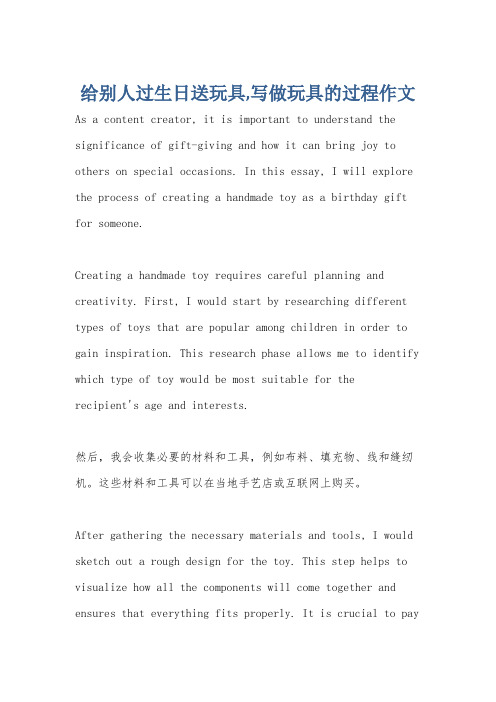
给别人过生日送玩具,写做玩具的过程作文As a content creator, it is important to understand the significance of gift-giving and how it can bring joy to others on special occasions. In this essay, I will explore the process of creating a handmade toy as a birthday gift for someone.Creating a handmade toy requires careful planning and creativity. First, I would start by researching different types of toys that are popular among children in order to gain inspiration. This research phase allows me to identify which type of toy would be most suitable for therecipient's age and interests.然后,我会收集必要的材料和工具,例如布料、填充物、线和缝纫机。
这些材料和工具可以在当地手艺店或互联网上购买。
After gathering the necessary materials and tools, I would sketch out a rough design for the toy. This step helps to visualize how all the components will come together and ensures that everything fits properly. It is crucial to payattention to detail during this process, ensuring that each part of the toy is both safe and attractive.接下来,我会开始裁剪和缝纫。
gift 英语作文
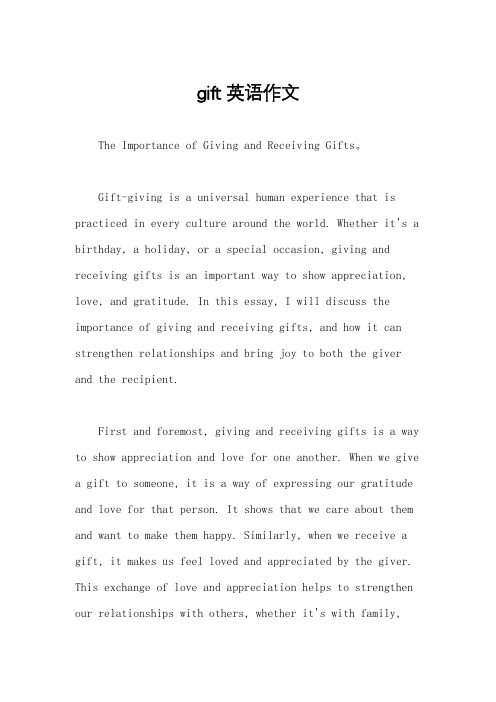
gift 英语作文The Importance of Giving and Receiving Gifts。
Gift-giving is a universal human experience that is practiced in every culture around the world. Whether it's a birthday, a holiday, or a special occasion, giving and receiving gifts is an important way to show appreciation, love, and gratitude. In this essay, I will discuss the importance of giving and receiving gifts, and how it can strengthen relationships and bring joy to both the giver and the recipient.First and foremost, giving and receiving gifts is a way to show appreciation and love for one another. When we give a gift to someone, it is a way of expressing our gratitude and love for that person. It shows that we care about them and want to make them happy. Similarly, when we receive a gift, it makes us feel loved and appreciated by the giver. This exchange of love and appreciation helps to strengthen our relationships with others, whether it's with family,friends, or romantic partners.Furthermore, giving and receiving gifts can bring joy and happiness to both the giver and the recipient. When we give a gift, it brings us joy to see the happiness and gratitude on the recipient's face. It makes us feel good to know that we have made someone else happy. On the other hand, when we receive a gift, it brings us joy and happiness to know that someone cares about us and wants to make us happy. This exchange of joy and happiness can create a positive and uplifting experience for both parties involved.In addition, giving and receiving gifts can create lasting memories and traditions. When we give and receive gifts, it creates special moments and memories that we will cherish for years to come. Whether it's a childhood memory of receiving a special gift from a loved one, or a cherished tradition of exchanging gifts with family and friends during the holidays, these experiences can create a sense of connection and unity among people. It can also create a sense of continuity and tradition, as we pass downthe practice of gift-giving to future generations.Finally, giving and receiving gifts can be a way to support and uplift others in times of need. Whether it's a simple gesture of kindness or a more substantial gift, giving to those in need can bring hope and encouragement to someone who is struggling. Similarly, when we receive agift during a difficult time, it can provide comfort and support from others. This act of giving and receiving can create a sense of community and solidarity, as we come together to support one another in times of need.In conclusion, giving and receiving gifts is an important practice that can strengthen relationships, bring joy and happiness, create lasting memories and traditions, and support others in times of need. Whether it's a small token of appreciation or a grand gesture of love, the act of giving and receiving gifts is a powerful way to show our love and gratitude for one another. So, let's continue to practice the art of gift-giving, and spread love and joy to those around us.。
你会在你家人生日那天做什么英语作文

你会在你家人生日那天做什么英语作文On the day of my family member's birthday, there are several things I would do to make it a special and memorable day. Birthdays are a time to celebrate and show our love and appreciation for our loved ones. In this article, I will outline the activities and preparations I would make on this special day.Firstly, I would start the day by preparing a delicious breakfast for the birthday person. I would make their favorite dishes and set a beautifully decorated table to create a festive atmosphere. It's important to start the day on a positive note and make the birthday person feel special right from the beginning.After breakfast, I would plan a surprise outing or activity for the birthday person. It could be a visit to a museum, a picnic in the park, or even a day trip to their favorite destination. The key is to choose something that they would enjoy and create lasting memories. It's important to involve the birthday person in the decision-making process to ensure they have a great time.In the afternoon, I would organize a small gathering with close friends and family. It could be a simple get-together at home or a reservation at their favorite restaurant. The focus should be on spending quality time together and enjoying each other's company. I would decorate the venue with balloons, streamers, and a birthday banner to add a festive touch.During the gathering, I would arrange for a surprise birthday cake. It could be a customized cake with their name and age or a cake with their favorite flavor. As the cake is brought out, everyone would sing the birthday song and the birthday person would blow out the candles. This tradition adds a special touch to the celebration and creates a sense of joy and unity.In addition to the cake, I would also prepare a few games or activities to keep everyone entertained. It could be a trivia quiz about the birthday person, a scavenger hunt,or even a karaoke session. The goal is to create a lively and enjoyable atmosphere where everyone can participate and have fun.Towards the evening, I would arrange for a special birthday dinner. It could be a home-cooked meal with their favorite dishes or a reservation at a fancy restaurant. The ambiance should be cozy and intimate, allowing for meaningful conversations and reflection on the past year. It's important to make the birthday person feel loved and appreciated on their special day.After dinner, it's time for presents! I would encourage everyone to prepare a thoughtful gift for the birthday person. It could be something they have been wanting for a long time or a sentimental gift that holds a special meaning. The act of giving and receiving gifts adds an element of surprise and excitement to the celebration.To end the day on a high note, I would organize a small surprise party at home. It could include close friends and family members who couldn't attend the earlier gathering. We would play music, dance, and enjoy each other's company. It's important to create a joyful and celebratory atmosphere to make the birthday person feel cherished and loved.In conclusion, celebrating a family member's birthday is an opportunity to show our love and appreciation. By starting the day with a special breakfast, planning a surprise outing, organizing a gathering, preparing games and activities, enjoying a birthday dinner, exchanging gifts, and ending with a surprise party, we can create a memorable and meaningful birthday celebration. It's all about making the birthday person feel special and creating lasting memories with our loved ones.。
给予与接受作文英文

给予与接受作文英文英文:Giving and receiving are two important aspects of human interaction. We give and receive gifts, compliments, help, and many other things in our daily lives. In my opinion, both giving and receiving are equally important, but they serve different purposes.When we give something to someone, we show our love, care, and appreciation for them. It can be a small gesture like holding the door open for someone or a big one like donating money to a charity. Giving is not only beneficial for the receiver but also for the giver. It gives us a sense of fulfillment and happiness knowing that we have made someone's day a little better.On the other hand, receiving is equally important as it helps us to build relationships and connect with others. When we receive something, it shows that someone caresabout us and wants to make us happy. It can be a simple compliment or a thoughtful gift. Receiving also teaches us to be grateful and appreciate the people around us.In my personal experience, I have found that giving and receiving work hand in hand. For example, when I give agift to someone, and they receive it with gratitude, it makes me happy and strengthens our relationship. Similarly, when someone gives me a compliment or helps me in some way, it makes me feel valued and appreciated.In conclusion, giving and receiving are two essential aspects of human interaction, and both play a crucial role in building relationships and connecting with others.中文:给予和接受是人际交往中的两个重要方面。
最特别的礼物英语作文
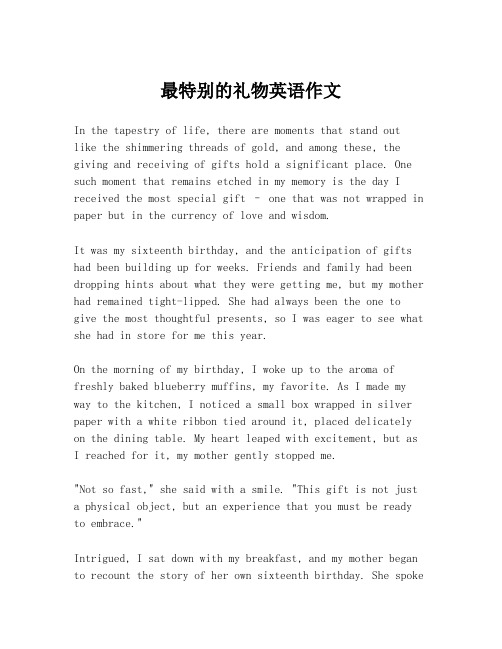
最特别的礼物英语作文In the tapestry of life, there are moments that stand outlike the shimmering threads of gold, and among these, the giving and receiving of gifts hold a significant place. One such moment that remains etched in my memory is the day I received the most special gift – one that was not wrapped in paper but in the currency of love and wisdom.It was my sixteenth birthday, and the anticipation of gifts had been building up for weeks. Friends and family had been dropping hints about what they were getting me, but my mother had remained tight-lipped. She had always been the one to give the most thoughtful presents, so I was eager to see what she had in store for me this year.On the morning of my birthday, I woke up to the aroma of freshly baked blueberry muffins, my favorite. As I made my way to the kitchen, I noticed a small box wrapped in silver paper with a white ribbon tied around it, placed delicately on the dining table. My heart leaped with excitement, but as I reached for it, my mother gently stopped me."Not so fast," she said with a smile. "This gift is not just a physical object, but an experience that you must be ready to embrace."Intrigued, I sat down with my breakfast, and my mother began to recount the story of her own sixteenth birthday. She spokeof the lessons she had learned, the challenges she had faced, and the wisdom she had gained. As she spoke, I realized that the gift was not in the box, but in the conversation we were having.The box remained unopened as we spent the day together, doing things I loved – visiting the art museum, having a picnic in the park, and watching the sunset by the river. Each moment was filled with laughter, deep conversations, and aconnection that transcended the usual mother-daughter dynamic.As the day turned to night, we returned home, and my mother finally handed me the box. With trembling hands, I untied the ribbon and lifted the lid. Inside, I found a simple silver pendant with an inscription: "Cherish the moments, for they become the memories that bind us."The pendant was beautiful, but it was the day we had spent together and the stories shared that made it the most special gift I have ever received. It was a gift that kept on giving, as every time I wear the pendant, I am reminded of the love, the wisdom, and the priceless moments that are the true treasures of life.In the end, the most special gifts are not the ones that canbe held or seen, but those that touch the heart and soul, leaving an indelible mark on our lives. My mother's gift was such a treasure, one that I will forever cherish and pass onto future generations as a testament to the power of love and the importance of the moments we share.。
中国送礼文化的风俗禁忌英文作文

中国送礼文化的风俗禁忌英文作文The Wonderful World of Gift-Giving in ChinaGiving and receiving gifts is a big part of Chinese culture. It's a way to show respect, build relationships, and celebrate special occasions. But there are lots of interesting rules and customs around gift-giving that you need to know!One of the most important things is the meaning behind colors and numbers. In China, different colors symbolize different things. Red is very lucky and stands for happiness and prosperity. That's why red envelopes with money are given out during Chinese New Year. Pink also means love and romance. But you should never wrap a gift in white, blue, or black paper because those colors can mean sadness or death!Numbers are important too. The number 8 is considered very fortunate because in Chinese it sounds similar to the word for "wealth". Prices with 8s, like 88 or 888, are seen as bringers of good luck. But 4 is unlucky because it sounds a bit like the word for "death". You'll rarely see things priced with 4s.There are also traditions around when you give gifts. The biggest gift-giving celebration is Chinese New Year. Kids receive red envelopes filled with "lucky money" from parents,grandparents, and relatives. Other major holidays for exchanging gifts include the Mid-Autumn Festival, weddings, and opening a new business.Birthdays are celebrated too, but not quite like in the West. Instead of one big birthday party with gifts, Chinese people give small gifts throughout their birthday month. Older adults especially appreciate gifts of food, fruit, or herbs thought to promote health and longevity.Speaking of food gifts, there are definitely some taboos to watch out for! You should never give scissors, knives, or anything sharp because it's considered offensive and could "cut" the relationship. Clocks are also a no-no since the words for "clock" and "the end" sound alike. Shoes, umbrellas, and pillows are taboo too for complex cultural reasons.Safe gifts include food items like chocolates, dried fruits, nuts, and tea. These are considered luxuries and show you want to nourish the recipient. Don't go overboard though - very expensive gifts can make the receiver uncomfortable. Small tokens that show effort and personal thought are best.Finally, there's an art to receiving gifts properly. When you open a gift, never immediately blurt out "Wow, thanks!" In Chinese culture, this is considered greedy. Instead, politely refuseto open it a few times before finally accepting with thanks. But don't immediately try it on or show the gift around, as that's also impolite.The giving and receiving process has many rituals, but don't get overwhelmed! These customs have developed over thousands of years out of respect and care for relationships. As long as you put thought into your gifts and present them humbly, you'll be just fine in the gift-giving world.。
送礼物的英语作文
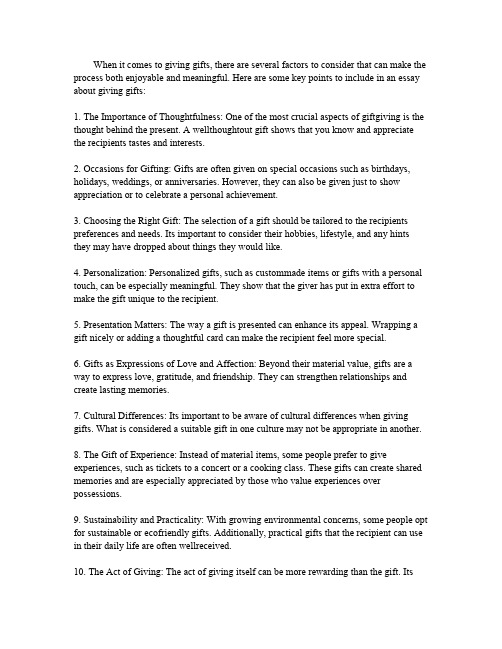
When it comes to giving gifts,there are several factors to consider that can make the process both enjoyable and meaningful.Here are some key points to include in an essay about giving gifts:1.The Importance of Thoughtfulness:One of the most crucial aspects of giftgiving is the thought behind the present.A wellthoughtout gift shows that you know and appreciate the recipients tastes and interests.2.Occasions for Gifting:Gifts are often given on special occasions such as birthdays, holidays,weddings,or anniversaries.However,they can also be given just to show appreciation or to celebrate a personal achievement.3.Choosing the Right Gift:The selection of a gift should be tailored to the recipients preferences and needs.Its important to consider their hobbies,lifestyle,and any hints they may have dropped about things they would like.4.Personalization:Personalized gifts,such as custommade items or gifts with a personal touch,can be especially meaningful.They show that the giver has put in extra effort to make the gift unique to the recipient.5.Presentation Matters:The way a gift is presented can enhance its appeal.Wrapping a gift nicely or adding a thoughtful card can make the recipient feel more special.6.Gifts as Expressions of Love and Affection:Beyond their material value,gifts are a way to express love,gratitude,and friendship.They can strengthen relationships and create lasting memories.7.Cultural Differences:Its important to be aware of cultural differences when giving gifts.What is considered a suitable gift in one culture may not be appropriate in another.8.The Gift of Experience:Instead of material items,some people prefer to give experiences,such as tickets to a concert or a cooking class.These gifts can create shared memories and are especially appreciated by those who value experiences over possessions.9.Sustainability and Practicality:With growing environmental concerns,some people opt for sustainable or ecofriendly gifts.Additionally,practical gifts that the recipient can use in their daily life are often wellreceived.10.The Act of Giving:The act of giving itself can be more rewarding than the gift.Itsabout sharing joy and making someone feel valued.11.Etiquette:There are certain etiquette rules to follow when giving gifts,such as not expecting something in return,and being mindful of the timing and manner of presenting the gift.12.Online Gifting:With the rise of ecommerce,online gifting has become popular.It offers convenience and a wider range of options but may lack the personal touch of a gift purchased in person.13.Gift Regrets:Sometimes,gifts may not be wellreceived.Its important to handle such situations with grace and understanding,possibly offering to exchange the gift if its not to the recipients liking.14.The Joy of Receiving:While the focus is often on the giver,the joy of receiving a gift should not be overlooked.Its an affirmation of ones importance to another person.15.Gifts and Memories:Over time,certain gifts can become cherished keepsakes, serving as reminders of special moments and the people who have touched our lives.In conclusion,giftgiving is a complex and nuanced tradition that involves much more than simply exchanging items.Its a way to communicate feelings,celebrate milestones, and strengthen bonds between people.Whether its a small token of appreciation or a grand gesture,the true value of a gift lies in the sentiment behind it.。
中美收礼物的差异英文作文
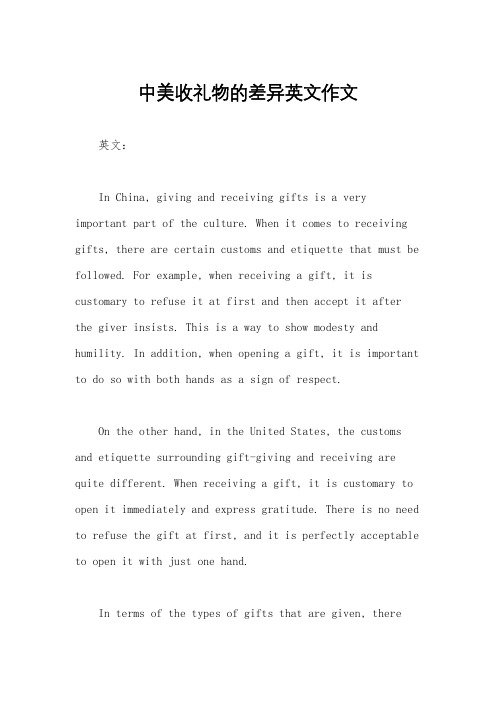
中美收礼物的差异英文作文英文:In China, giving and receiving gifts is a very important part of the culture. When it comes to receiving gifts, there are certain customs and etiquette that must be followed. For example, when receiving a gift, it is customary to refuse it at first and then accept it after the giver insists. This is a way to show modesty and humility. In addition, when opening a gift, it is important to do so with both hands as a sign of respect.On the other hand, in the United States, the customs and etiquette surrounding gift-giving and receiving are quite different. When receiving a gift, it is customary to open it immediately and express gratitude. There is no need to refuse the gift at first, and it is perfectly acceptable to open it with just one hand.In terms of the types of gifts that are given, thereare also differences between the two cultures. In China, it is common to give gifts that are practical and useful, such as food, tea, or household items. These gifts are often given as a way to show appreciation and respect. In the United States, gifts are often more personal and may include items such as clothing, jewelry, or electronics.Overall, the customs and etiquette surrounding gift-giving and receiving in China and the United States are quite different, reflecting the unique cultural values and traditions of each country.中文:在中国,送礼和接受礼物是文化的重要组成部分。
- 1、下载文档前请自行甄别文档内容的完整性,平台不提供额外的编辑、内容补充、找答案等附加服务。
- 2、"仅部分预览"的文档,不可在线预览部分如存在完整性等问题,可反馈申请退款(可完整预览的文档不适用该条件!)。
- 3、如文档侵犯您的权益,请联系客服反馈,我们会尽快为您处理(人工客服工作时间:9:00-18:30)。
Gift:Moon cakes
• Exists among young generation
• Gifts:“Peaceful Fruit”---Apple
Mothers’ Day and Fathers’ Day
• Taboos:Pears,Odd Numbers, Number Four
• Popular Stuffs:Apples,Even Number (esp. involves six and eight)
Valentine’s Day
Gifts:Roses and chocolates
Meaning:Sweet and love
Wedding,
Entrance feast
Red Envelope contains money
Housewarming
Tng and Receiving
The choose of opportunity to send gifts:In private
Women’s Day
• Flowers scarfs, perfumes, clothes , etc.
Qingming
Purpose:To honor the dead Put wreathes on their tombstones
Dragon Boat Festival
Activities: • Eating “Zongzi” • Racing boat
Gifts We Send:Fruits and local specialties Make-ups and perfumes for women Wine and tobaccos for man Toys and snacks for kids;Red envelope
Superstitions
Receiving:Refuse two or three times Do not unwrap it immediately
Exchanging
Not suppose to be in hurry Relative equivalent present
• Activities:Hang out or go for a barbecue etc just to relax
Spring Festival
Most Important for Chinese
Activity and Purpose:Call upon relatives and friends to show our concern Form:Personal Visit
Children’s Day
• Candies,ice creams and snacks • Little gadgets they like
Qixi
(The Chinese Valentine’s Day )
• Westernized
• Not as popular as Western Valentine’s Day
• Like Christmas,not officially affirmed in China Be promoted by the businesses
• Carnations for mom
• Shavers or belts for dad
Special Days and Occasions
Gift Giving and Receiving on Special Days in China
Simon 2014 6 10
Affection > Value
Purpose:Develop Emotional Attachment
New Year’s Day May Day National Day
• Be more careful, they are more superstitious • Taboos:Clock,pear, medicines things white or black
Recommendations:Tea and fruits
Mid-autumn festival
Purpose:Families reunite
Teachers’ Day
• Flowers for them
Double Ninth Festival
• Purposes:
Initially:Climb mountains to avoid calamities Now: For Elderly People
Gifts For Elderly People
